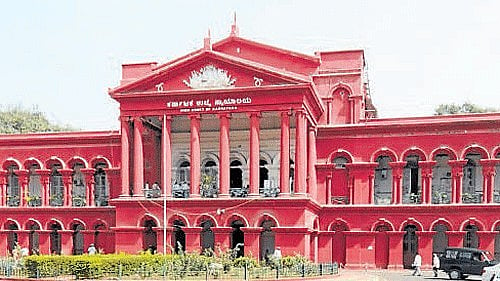
High Court of Karnataka
Credit: DH Photo
Bengaluru: The Karnataka High Court has dismissed the petition filed by an employee of the office of the principal, District Institute of Education and Training Principal District Institute of Education and Training, Bengaluru. The petitioner, G Nanjegowda, had challenged his dismissal from service after being convicted in a criminal case.
Nanjegowda was working as a second division assistant (SDA) and was involved in an assault case in 2001. In 2011, he was sentenced to two years' imprisonment by a court in Magadi, which was upheld by the High Court in 2016.
On November 18, 2023, he was dismissed from service. On October 25, 2024, his petition before the Karnataka State Administrative Tribunal, challenging the dismissal was rejected. His contention before the High Court was that even Rule 14 of the Karnataka Civil Services (Classification, Control and Appeal) Rules does not provide for automatic dismissal from service when a civil servant is convicted on a charge in a criminal trial.
A division bench comprising Justice Krishna S Dixit and Justice Ramachandra D Huddar noted that the dismissal from service on the ground of conviction and sentence in a criminal case involving moral turpitude cannot be faltered as Rule 14 of the 1957 Rules is as clear as the Gangetic waters.
"The expression 'the disciplinary authority may' in the circumstances should be construed as 'must'. A person convicted for a serious offence is not desirable in public service. The offence committed has no nexus to the official duties or conditions of service, and is too poor a justification to retain the convict in public service. It goes without saying that if conviction in a criminal case is a bar to public appointment, ipso facto it is a ground for removal from service. An argument to the contrary would strike at the root of reason and logic,” the bench said.
The court further said, "The vehement submission on behalf of the petitioner that, despite conviction and sentence, the petitioner ought to have been given an opportunity to explain the circumstances that led to the same, does not fit into the scheme of the Rules. If a civil servant is acquitted in a criminal case, still he can be subjected to disciplinary enquiry. However, ordinarily there is no need to hold disciplinary inquiry when conviction has been entered after the trial for an offence involving moral turpitude. The subject Rule does not need sentencing at all, conviction per se being its focal point.”